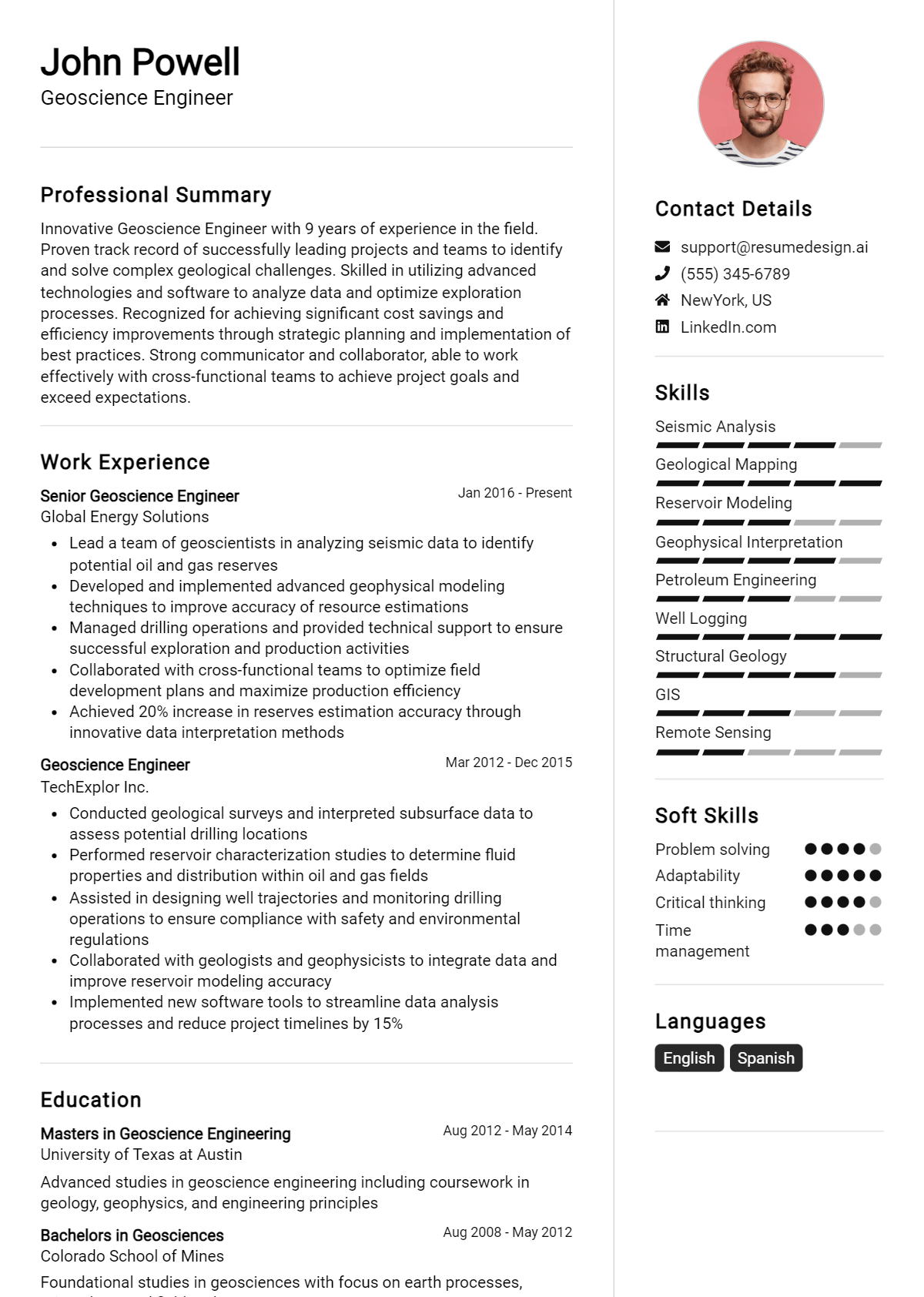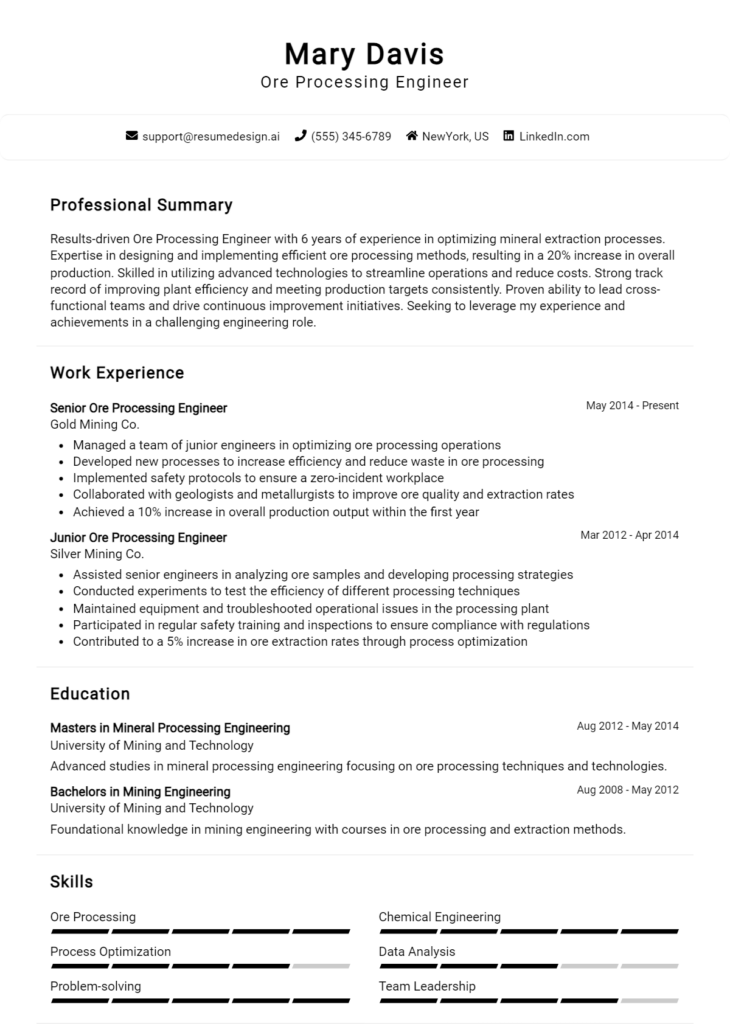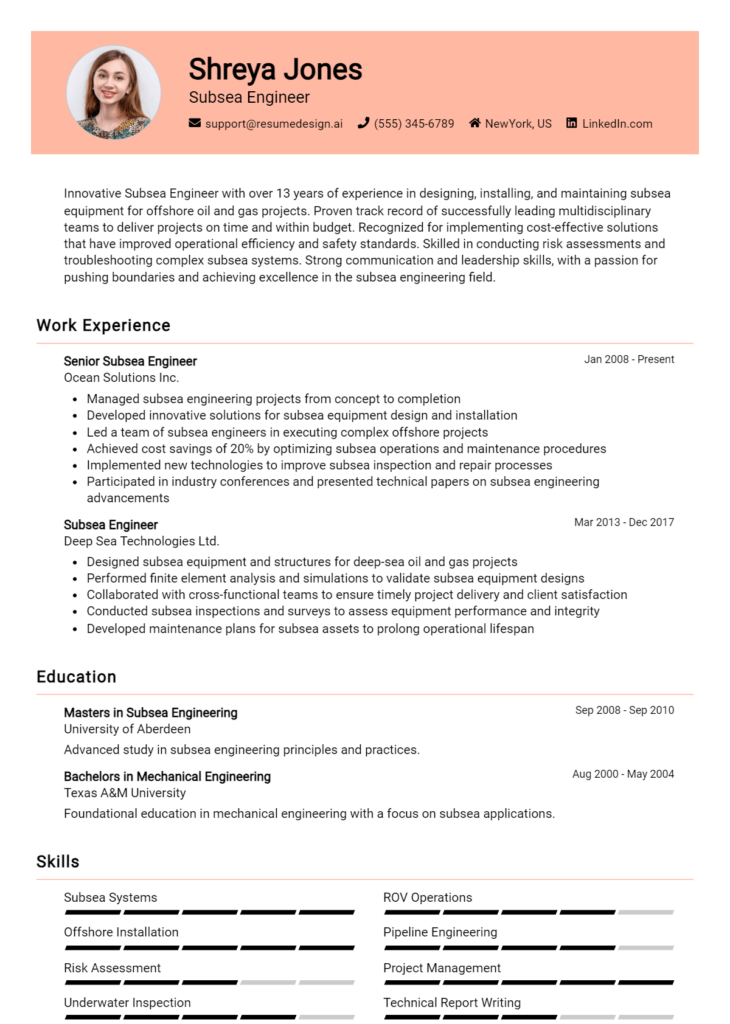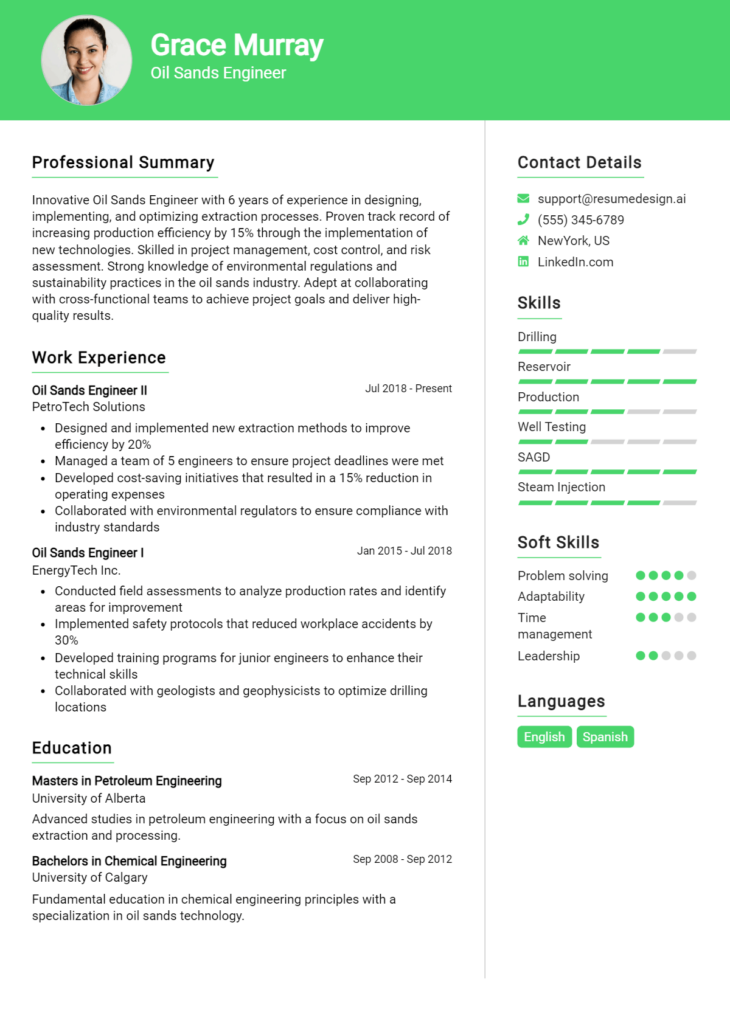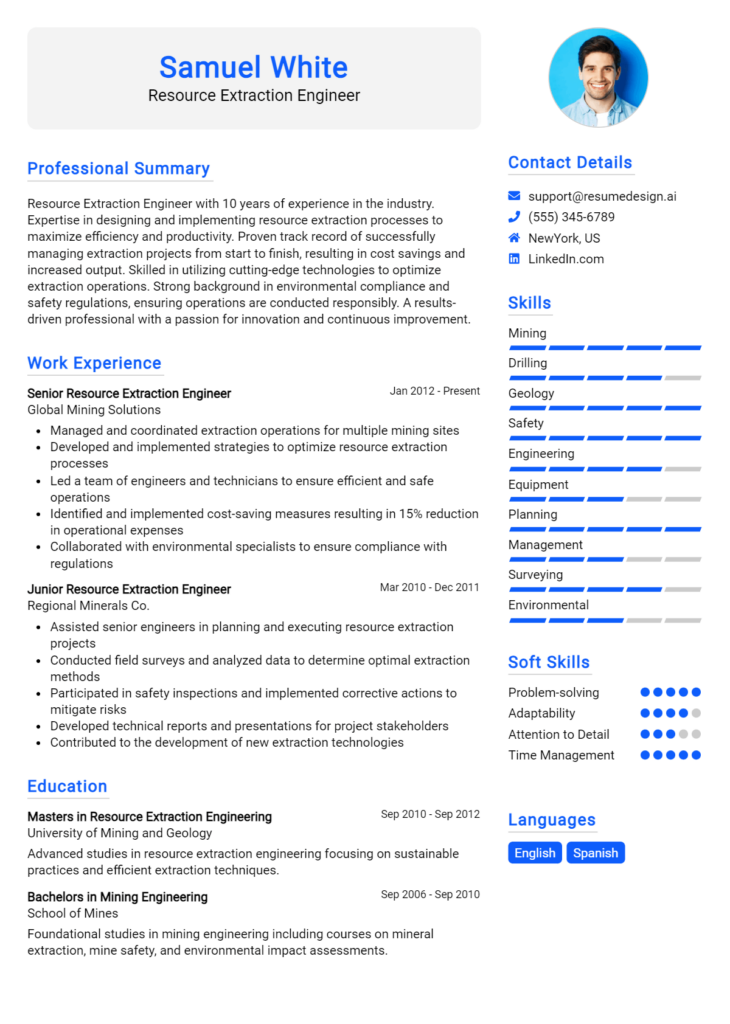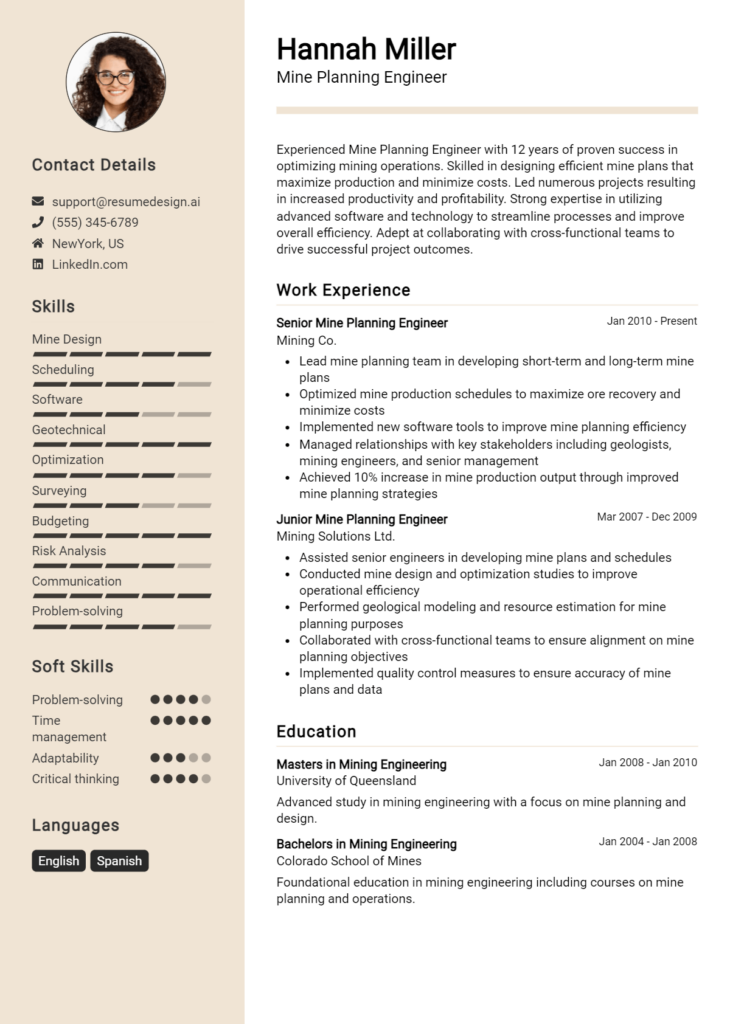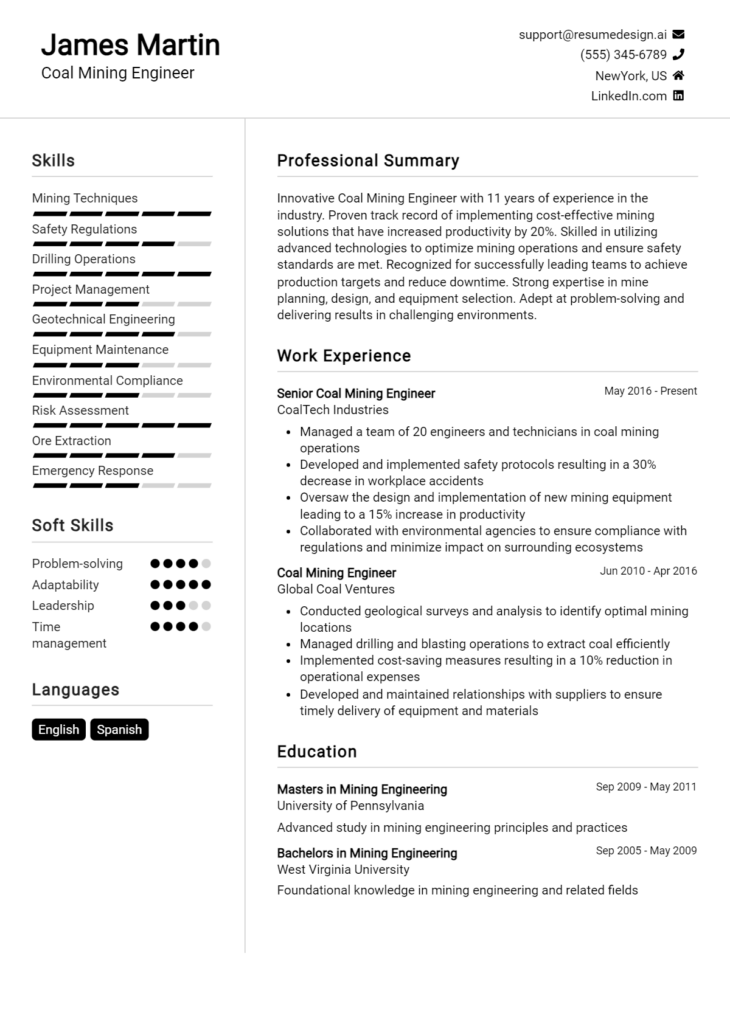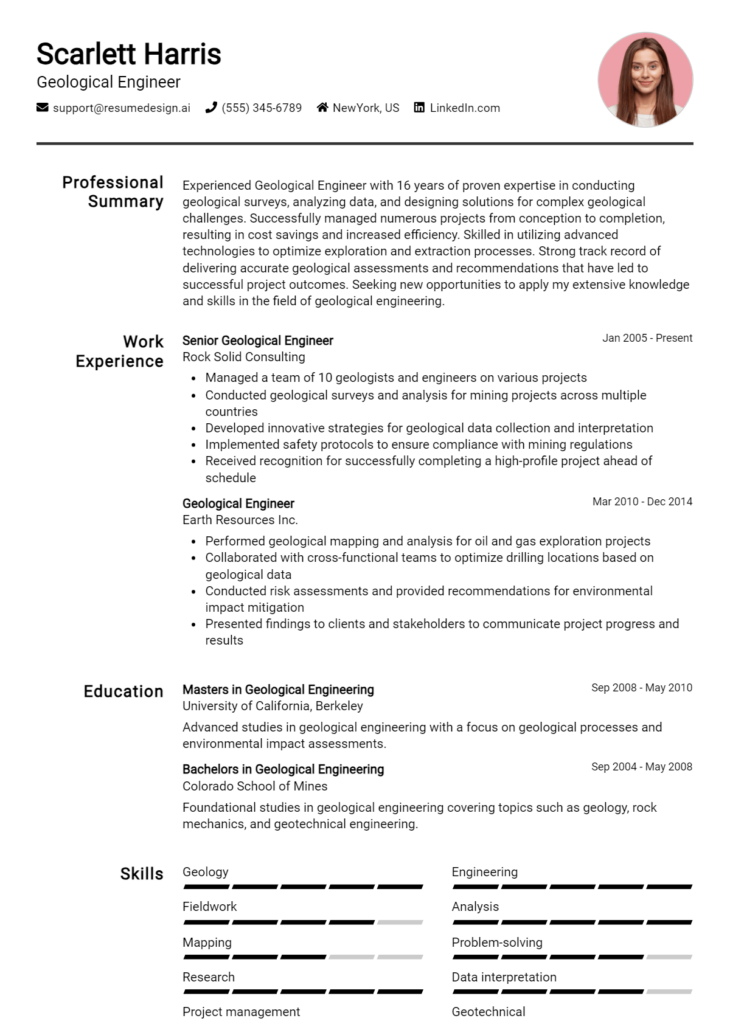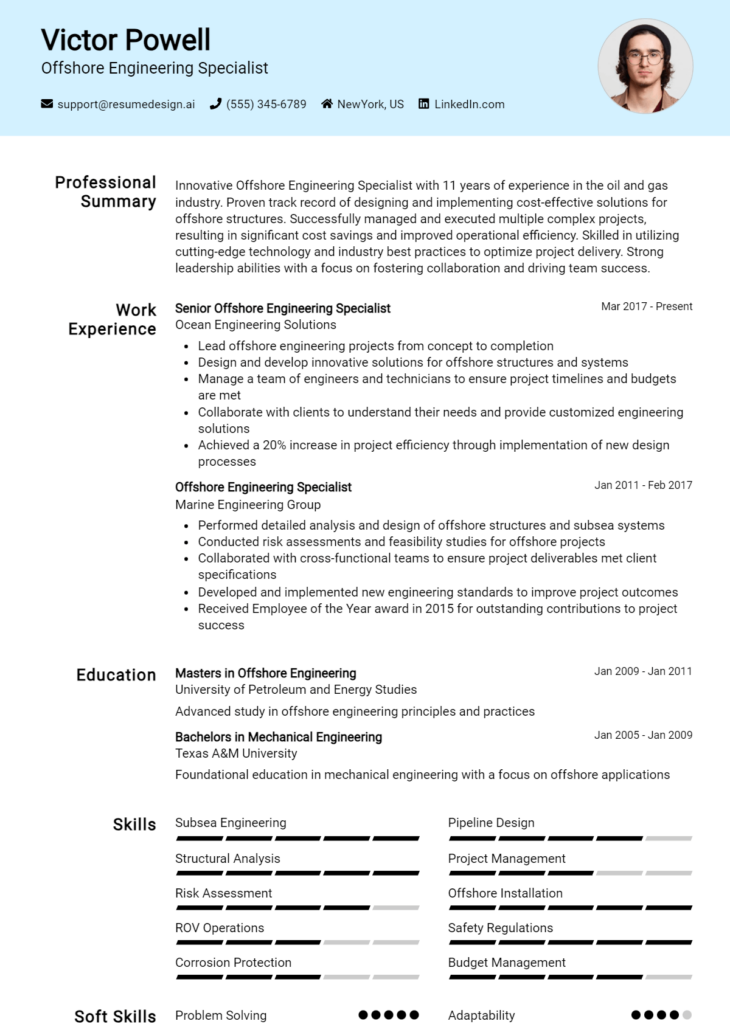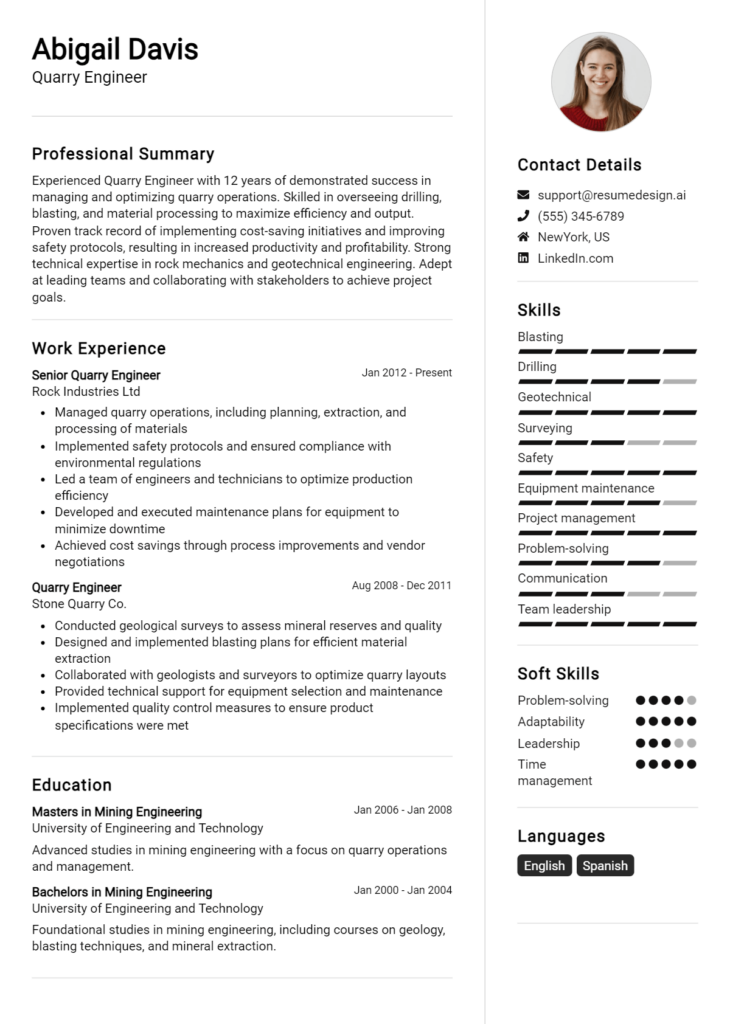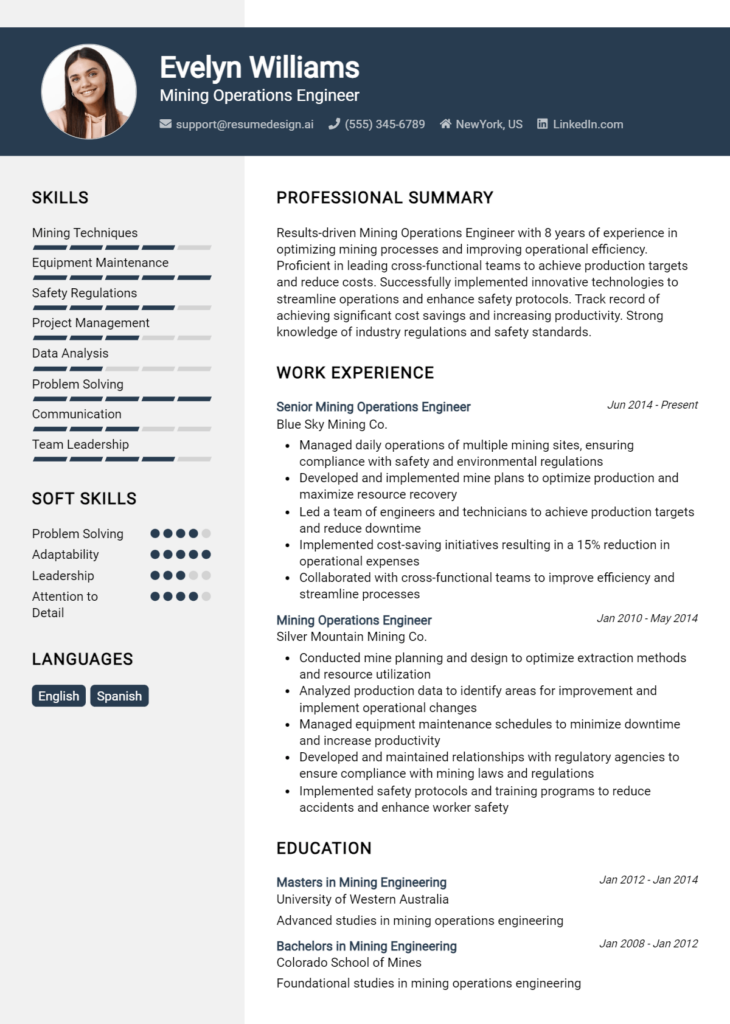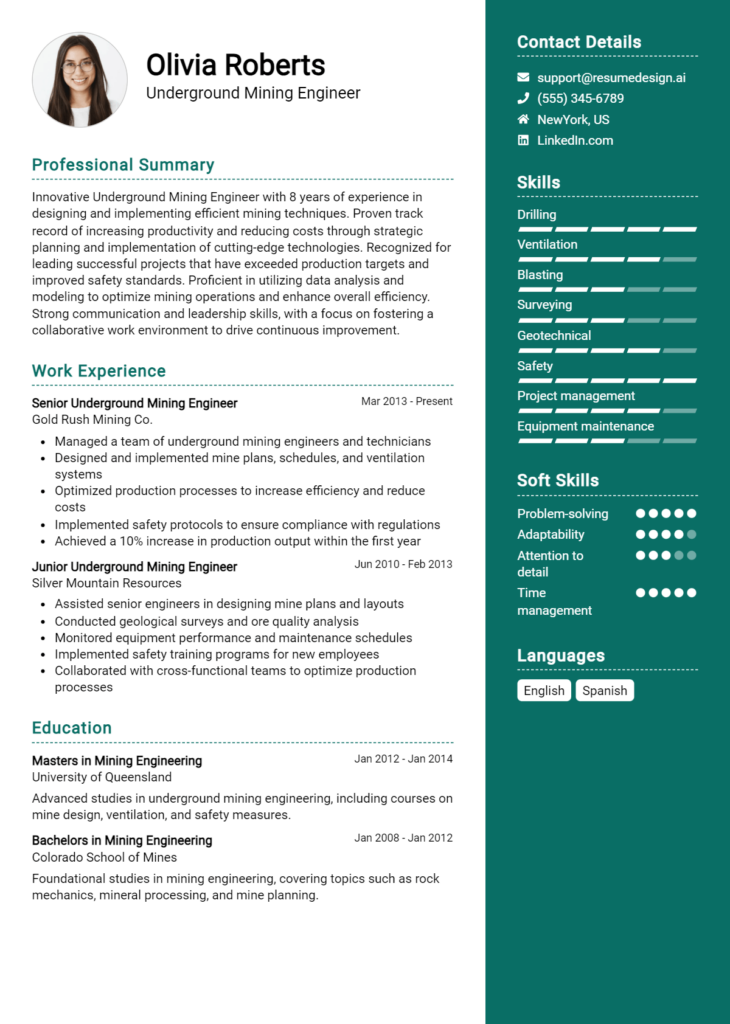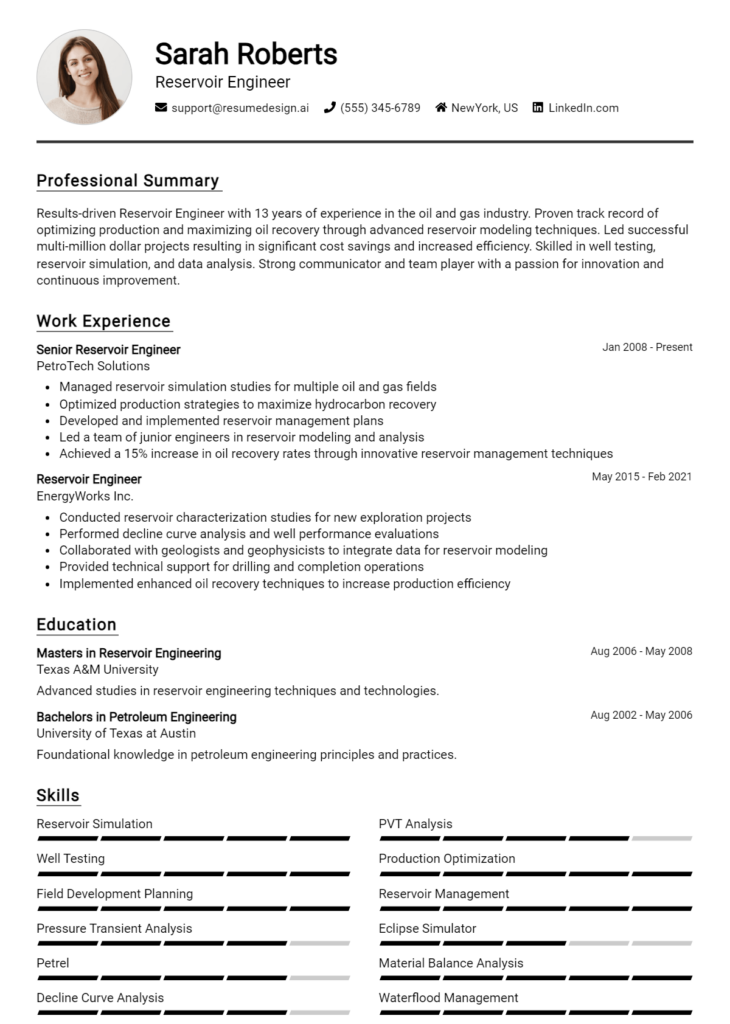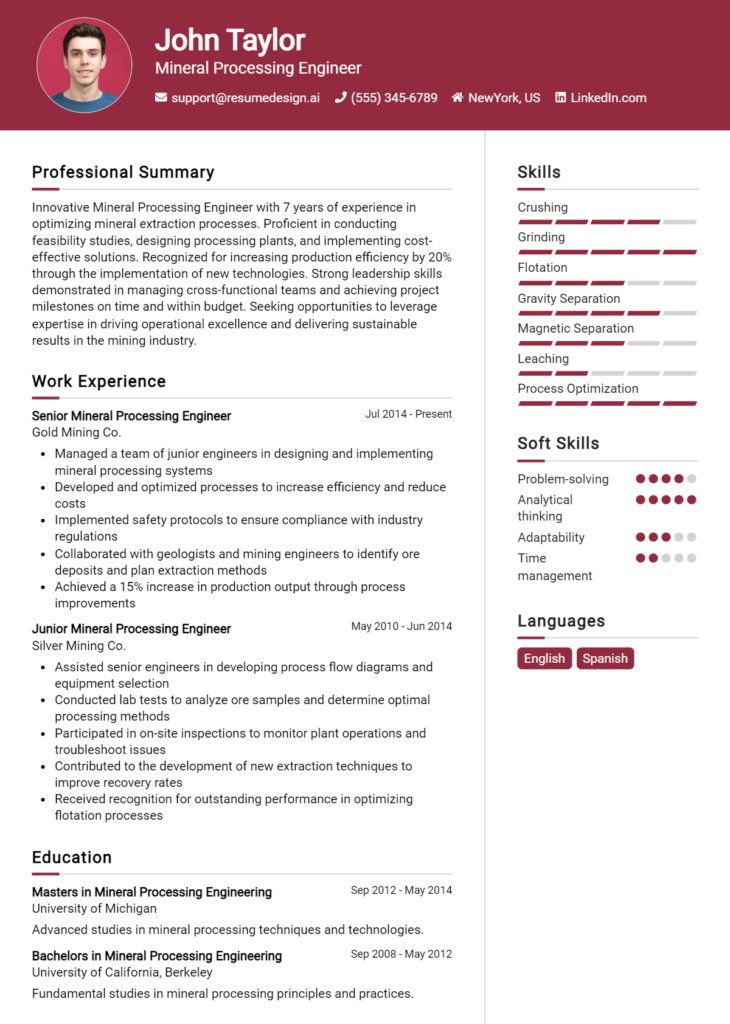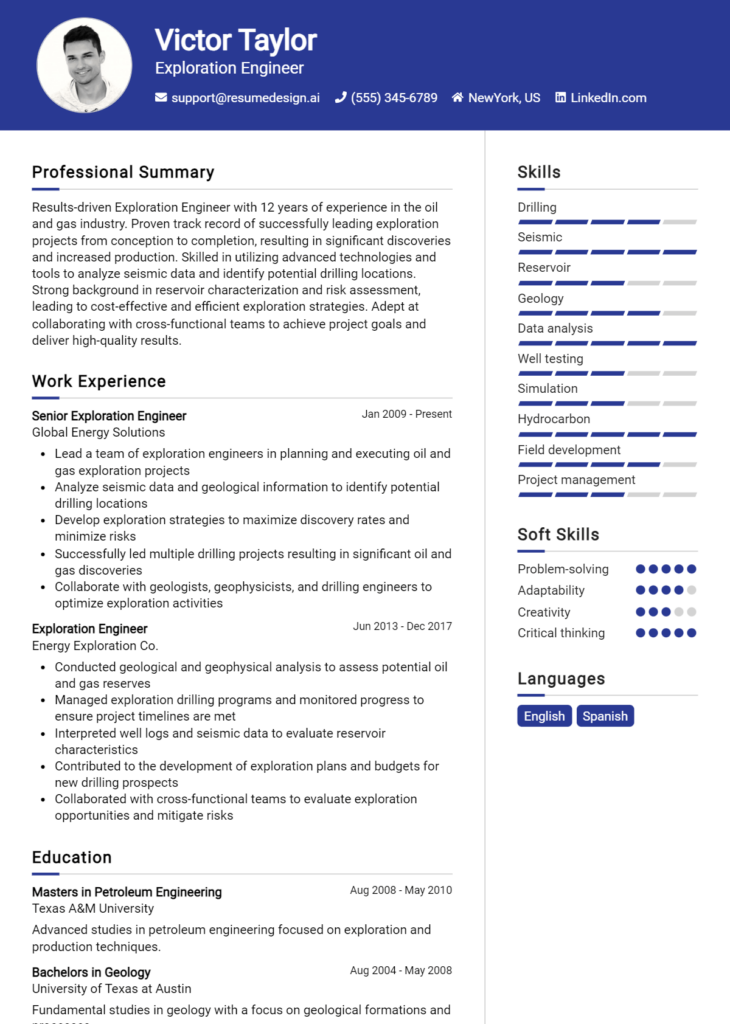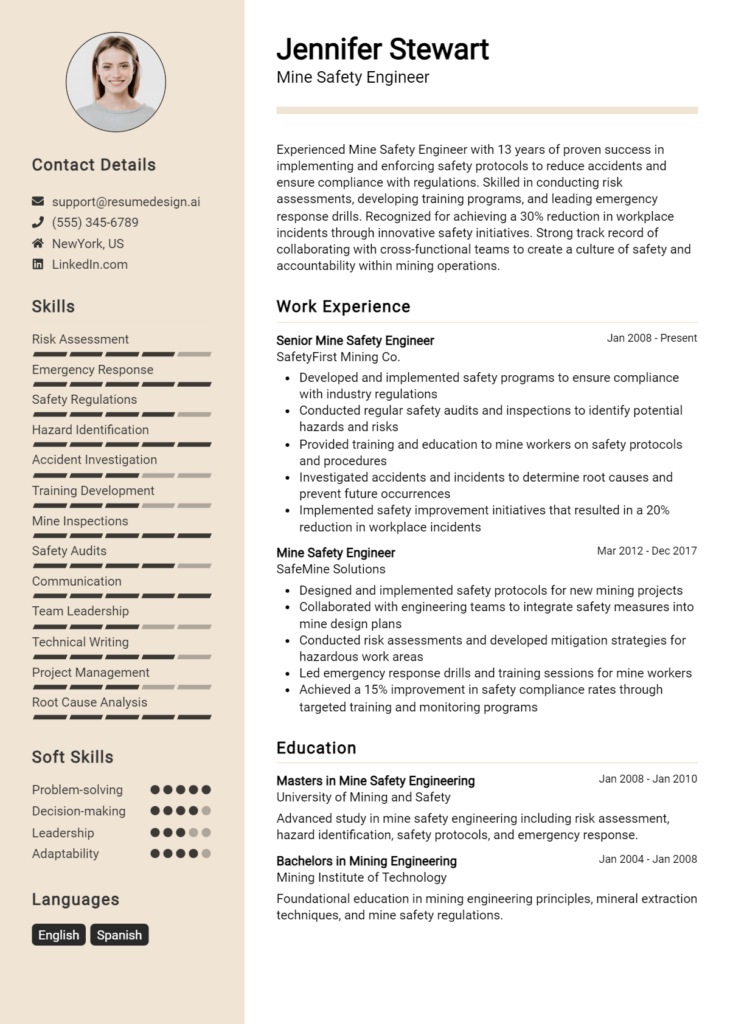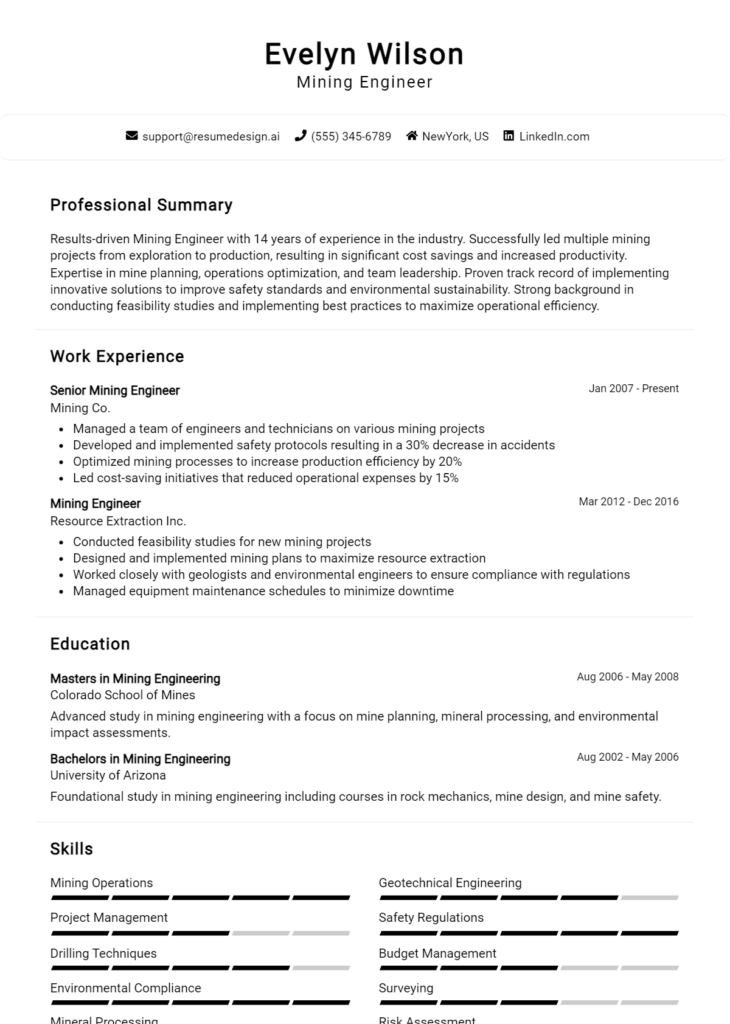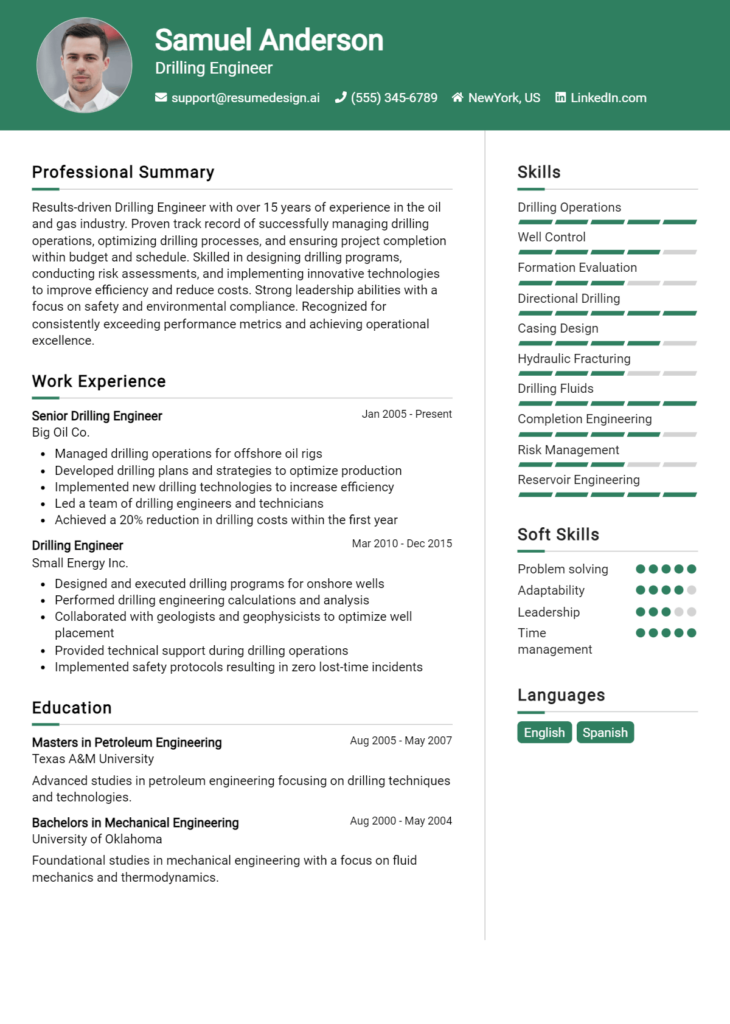Geoscience Engineer Core Responsibilities
A Geoscience Engineer plays a pivotal role in bridging various departments, integrating geology, physics, and engineering principles to enhance resource exploration and environmental management. Key responsibilities include conducting geological surveys, analyzing data, and developing solutions to complex geoscientific problems. Essential skills encompass technical proficiency, operational insight, and strong problem-solving abilities, all critical for achieving organizational objectives. A well-structured resume can effectively showcase these qualifications, highlighting the candidate's contributions to multidisciplinary projects.
Common Responsibilities Listed on Geoscience Engineer Resume
- Conduct geological and geophysical surveys to assess resource locations.
- Analyze geological data to inform project planning and development.
- Develop and implement geoscience models for resource exploration.
- Collaborate with environmental scientists to ensure compliance with regulations.
- Prepare technical reports and presentations for stakeholders.
- Utilize software tools for data analysis and visualization.
- Provide recommendations for drilling and extraction methods.
- Participate in fieldwork, collecting samples and conducting tests.
- Monitor project progress and assess potential risks.
- Engage in interdisciplinary teamwork to solve engineering challenges.
- Stay updated on industry trends and advancements in geoscience.
High-Level Resume Tips for Geoscience Engineer Professionals
A well-crafted resume is crucial for Geoscience Engineer professionals, as it often serves as the first impression a candidate makes on potential employers. In a competitive job market, your resume must not only highlight your technical skills and academic achievements but also reflect your unique contributions to the field. It should tell a story of your professional journey, showcasing how your expertise aligns with the specific needs of the role you’re applying for. This guide will provide practical and actionable resume tips specifically tailored for Geoscience Engineer professionals, helping you stand out and secure that desired interview.
Top Resume Tips for Geoscience Engineer Professionals
- Tailor your resume to each job description by using keywords and phrases that reflect the qualifications and skills required for the position.
- Begin with a strong summary statement that encapsulates your experience, skills, and professional goals in geoscience engineering.
- Highlight relevant experience in the geoscience field, including internships, projects, and research, to demonstrate your hands-on knowledge.
- Quantify your achievements where possible, such as specifying the percentage of cost savings you achieved through innovative engineering solutions.
- Showcase your technical skills, including software proficiency (like GIS, AutoCAD, or other engineering tools) relevant to geoscience engineering.
- Include certifications, licenses, or additional training that enhance your qualifications, such as PE (Professional Engineer) certification.
- Demonstrate your ability to work in multidisciplinary teams by detailing collaborative projects and your role within them.
- Utilize action verbs to describe your experiences and accomplishments, making your resume more dynamic and impactful.
- Keep your resume concise, ideally one page, while ensuring all relevant information is clearly presented and easy to read.
- Proofread for grammatical errors and typos, as attention to detail is critical in engineering roles.
Implementing these tips can significantly enhance your chances of landing a job in the Geoscience Engineer field. A well-structured and tailored resume not only showcases your qualifications but also demonstrates your professionalism and attention to detail, making you a more attractive candidate to potential employers.
Why Resume Headlines & Titles are Important for Geoscience Engineer
In the competitive field of geoscience engineering, a well-crafted resume headline or title serves as the first impression a candidate makes on hiring managers. A strong headline immediately captures attention and succinctly conveys the candidate’s key qualifications in an impactful phrase. This critical component of a resume should be concise, relevant, and directly related to the job being applied for, allowing candidates to stand out in a sea of applicants. By summarizing core competencies and unique selling points, resume headlines can effectively set the tone for the rest of the application, enticing employers to read further.
Best Practices for Crafting Resume Headlines for Geoscience Engineer
- Keep it concise: Aim for one to two impactful phrases.
- Be specific: Tailor the headline to reflect the specific role you are applying for.
- Highlight key skills: Incorporate relevant technical skills or certifications that are in demand.
- Showcase achievements: Use quantifiable accomplishments to demonstrate your expertise.
- Utilize industry keywords: Incorporate terms that are commonly used in geoscience engineering.
- Avoid jargon: Use clear language that can be understood by all hiring managers, not just industry specialists.
- Reflect your value: Convey what you bring to the table as a geoscience engineer.
- Update regularly: Revise your headline to align with current job trends and your evolving skills.
Example Resume Headlines for Geoscience Engineer
Strong Resume Headlines
Dynamic Geoscience Engineer with 8+ Years of Experience in Environmental Impact Assessments
Results-Oriented Geoscience Engineer Specializing in Geological Mapping and Resource Management
Innovative Geoscience Engineer with Proven Track Record in Oil and Gas Exploration Projects
Expert Geoscience Engineer with Advanced Skills in Geophysical Data Analysis and Interpretation
Weak Resume Headlines
Geoscience Engineer Seeking Employment
Experienced Professional Looking for a Job
The strong headlines are effective because they clearly state the candidate's expertise, experience, and specific skills relevant to geoscience engineering, giving hiring managers a compelling reason to consider their application. In contrast, the weak headlines fail to impress due to their vagueness and lack of specific information, making it difficult for employers to understand what unique qualifications the candidate brings to the role. A well-crafted headline can significantly enhance a candidate's chances of standing out in a competitive job market.
Writing an Exceptional Geoscience Engineer Resume Summary
A well-crafted resume summary is crucial for a Geoscience Engineer as it serves as the first impression to hiring managers. This brief yet powerful statement provides an opportunity to quickly highlight key skills, relevant experiences, and notable accomplishments that align with the job role. A strong summary captures attention immediately, allowing the candidate to stand out in a competitive job market. By being concise and tailored specifically to the job description, the resume summary effectively communicates the candidate's potential value to the employer.
Best Practices for Writing a Geoscience Engineer Resume Summary
- Quantify Achievements: Use numbers and metrics to illustrate your accomplishments and impact in previous roles.
- Focus on Skills: Highlight technical skills and competencies that are relevant to the position you are applying for.
- Tailor the Summary: Customize your summary to reflect the specific requirements and keywords found in the job description.
- Use Action Words: Start sentences with strong action verbs to convey a sense of dynamism and proactivity.
- Keep it Concise: Aim for 2-4 sentences that encapsulate your professional profile without unnecessary fluff.
- Showcase Industry Knowledge: Mention any relevant industry standards, regulations, or technologies you are familiar with.
- Highlight Soft Skills: Include interpersonal skills that enhance your ability to work in teams or lead projects.
- Maintain Professional Tone: Use a formal yet engaging tone that reflects your expertise and professionalism.
Example Geoscience Engineer Resume Summaries
Strong Resume Summaries
Results-driven Geoscience Engineer with over 8 years of experience in subsurface analysis and resource management. Successfully led a team in a project that reduced exploration costs by 30% while increasing resource recovery by 20%. Proficient in geological modeling and data analysis, with a strong commitment to sustainable practices.
Detail-oriented Geoscience Engineer specializing in geotechnical investigations and environmental assessments. Instrumental in completing over 15 major projects under budget and ahead of schedule. Adept at utilizing advanced software tools for geological mapping and data interpretation.
Dynamic Geoscience Engineer with extensive experience in hydrocarbon exploration and reservoir engineering. Proven track record of developing innovative solutions that enhanced drilling efficiency by 25%. Excellent communicator skilled in collaborating with cross-functional teams to achieve project goals.
Weak Resume Summaries
Geoscience Engineer with experience in the field. Looking for a job where I can use my skills.
Motivated professional with knowledge in geology and engineering. Interested in working in a company that values hard work.
The strong resume summaries are considered effective because they provide quantifiable results, specific skills, and relevant experiences that align with the Geoscience Engineer role. They showcase the candidate’s accomplishments and demonstrate how they can add value to the prospective employer. In contrast, the weak resume summaries are vague, lack measurable outcomes, and fail to convey a clear picture of the candidate's qualifications or how they relate to the job, making them less impactful and memorable.
Work Experience Section for Geoscience Engineer Resume
The work experience section of a Geoscience Engineer resume is crucial in demonstrating the candidate's technical skills and their capacity to lead teams while delivering high-quality projects. This section not only highlights the practical applications of theoretical knowledge but also showcases the ability to manage complex tasks effectively. Candidates should focus on quantifying their achievements and aligning their experiences with industry standards, as this provides potential employers with evidence of the applicant's capability to contribute significantly to their organization.
Best Practices for Geoscience Engineer Work Experience
- Detail specific projects and technologies used to display technical expertise.
- Quantify achievements with metrics (e.g., reduced costs by 20%, increased efficiency by 30%).
- Emphasize collaboration with multidisciplinary teams to highlight teamwork skills.
- Include relevant certifications or software proficiencies to enhance credibility.
- Use action verbs to describe responsibilities and accomplishments clearly.
- Align experiences with job descriptions to demonstrate relevance.
- Highlight leadership roles or initiatives taken that led to successful outcomes.
- Provide context for challenges faced and solutions implemented to illustrate problem-solving skills.
Example Work Experiences for Geoscience Engineer
Strong Experiences
- Led a team of 10 engineers in a successful geotechnical assessment project, resulting in a 25% reduction in construction costs.
- Developed and implemented a new data analysis protocol that improved data accuracy by 40%, enhancing project decision-making processes.
- Collaborated with environmental scientists to complete a comprehensive risk assessment, ensuring compliance with federal regulations and reducing potential liabilities by 15%.
- Managed the integration of advanced geological modeling software, which increased project efficiency by 30% and improved stakeholder communication.
Weak Experiences
- Assisted in various projects without specifying roles or contributions.
- Worked on engineering tasks that were not clearly defined or quantified.
- Participated in team meetings and discussions about project updates.
- Helped with general data entry and analysis without highlighting specific outcomes or impacts.
The examples classified as strong showcase measurable outcomes, demonstrate technical leadership, and emphasize effective collaboration, making them compelling to potential employers. In contrast, the weak experiences lack specificity, quantifiable results, and clear contributions, which diminish their impact and fail to convey the candidate's true capabilities and achievements in the field of geoscience engineering.
Education and Certifications Section for Geoscience Engineer Resume
The education and certifications section of a Geoscience Engineer resume plays a crucial role in showcasing the candidate's academic achievements, specialized training, and commitment to continuous professional development. This section not only highlights relevant degrees and certifications but also demonstrates the candidate's alignment with industry standards and best practices. By detailing relevant coursework and recognized credentials, candidates can significantly enhance their credibility and appeal to potential employers, indicating that they possess both the theoretical knowledge and practical skills necessary for success in the field of geoscience engineering.
Best Practices for Geoscience Engineer Education and Certifications
- Prioritize relevant degrees: List degrees that align closely with geoscience engineering, such as geology, geophysics, or environmental engineering.
- Highlight industry-recognized certifications: Include certifications from reputable organizations, such as the American Society of Civil Engineers (ASCE) or the Society of Petroleum Engineers (SPE).
- Detail relevant coursework: Mention specific courses that are pertinent to the role, like hydrogeology, geostatistics, or seismic analysis.
- Include continuing education: Show commitment to professional growth by listing workshops, seminars, and online courses relevant to geoscience engineering.
- Use clear formatting: Present degrees and certifications in a consistent and easy-to-read format to enhance clarity.
- Consider chronological order: List the most recent education and certifications first to highlight your latest knowledge and skills.
- Tailor content to the job: Customize the education and certifications section based on the job description to emphasize the most relevant qualifications.
- Maintain accuracy: Ensure all information is up-to-date and accurately reflects your qualifications and achievements.
Example Education and Certifications for Geoscience Engineer
Strong Examples
- M.S. in Geoscience Engineering, University of XYZ, 2021
- Professional Engineer (PE) License in Geotechnical Engineering, 2022
- Certified Hydrogeologist (CHG), National Ground Water Association, 2023
- Coursework in Geophysical Methods and Environmental Impact Assessment, University of XYZ
Weak Examples
- Bachelor's Degree in History, ABC University, 2015
- Certification in Microsoft Office, 2020
- General Studies Certificate, Community College of XYZ, 2018
- Outdated Certification in Land Surveying, 2014
The examples categorized as strong are considered relevant due to their direct alignment with the skills and knowledge required for a Geoscience Engineer role. They showcase advanced degrees, recognized professional certifications, and pertinent coursework that equip the candidate for success in the field. Conversely, the weak examples lack relevance to geoscience engineering, featuring degrees and certifications that do not pertain to the industry, thus failing to enhance the candidate's qualifications for the desired role.
Top Skills & Keywords for Geoscience Engineer Resume
In the competitive field of geoscience engineering, having a well-crafted resume that highlights the right skills is essential for standing out to potential employers. Skills not only demonstrate your technical proficiency and ability to solve complex geological problems, but they also reflect your capacity to collaborate effectively within multidisciplinary teams and adapt to evolving project demands. An effective resume should showcase both hard and soft skills, as these are crucial for a successful career in geoscience engineering. To enhance your job application, consider integrating relevant skills that align with the expectations of employers in this dynamic industry.
Top Hard & Soft Skills for Geoscience Engineer
Soft Skills
- Critical thinking
- Problem-solving
- Communication skills
- Team collaboration
- Adaptability
- Time management
- Attention to detail
- Leadership
- Project management
- Interpersonal skills
- Analytical mindset
- Creativity
- Negotiation skills
- Conflict resolution
- Decision-making
- Initiative
- Emotional intelligence
- Cultural awareness
Hard Skills
- Geological mapping
- Geophysical interpretation
- Data analysis and modeling
- Geographic Information Systems (GIS)
- Remote sensing techniques
- Hydrogeology principles
- Soil mechanics
- Rock mechanics
- Environmental impact assessment
- Mineral exploration
- Drilling technology
- Reservoir engineering
- Geostatistics
- Seismic data analysis
- Petrophysics
- Well log analysis
- Engineering design software (e.g., AutoCAD, MATLAB)
- Knowledge of applicable regulations and safety standards
With a robust combination of these hard and soft skills, you can significantly enhance your resume and increase your chances of landing an interview in the geoscience engineering field. Additionally, don't forget to emphasize your relevant work experience to further strengthen your application.
Stand Out with a Winning Geoscience Engineer Cover Letter
Dear [Hiring Manager's Name],
I am writing to express my interest in the Geoscience Engineer position at [Company Name] as advertised on [Job Board/Company Website]. With a strong educational background in geology and environmental science, combined with hands-on experience in geotechnical analysis and resource exploration, I am eager to contribute my expertise to your innovative team. My passion for understanding Earth’s processes and my commitment to sustainable practices align perfectly with [Company Name]'s mission to advance responsible resource management.
In my previous role at [Previous Company Name], I successfully led a team of geologists and engineers in conducting extensive geological surveys and analyses to identify potential mineral resources. This involved using advanced geophysical techniques and data interpretation to assess site viability, which resulted in a 20% increase in resource recovery efficiency. My experience with Geographic Information Systems (GIS) and remote sensing technologies has equipped me with the skills necessary to analyze geological data, prepare detailed reports, and communicate findings effectively to stakeholders and clients.
I am particularly drawn to [Company Name] because of your commitment to innovation in geoscience and your emphasis on environmental stewardship. I am excited about the opportunity to work on projects that not only push the boundaries of geoscientific research but also focus on minimizing environmental impact. I am confident that my technical expertise, coupled with my ability to collaborate across multidisciplinary teams, would make a significant contribution to your ongoing projects and initiatives.
Thank you for considering my application. I am looking forward to the opportunity to discuss how my skills and experiences align with the needs of your team at [Company Name]. I am enthusiastic about the prospect of contributing to groundbreaking geoscience initiatives and am excited to potentially bring my expertise to your esteemed organization.
Sincerely,
[Your Name]
[Your Contact Information]
[LinkedIn Profile or Portfolio Link]
Common Mistakes to Avoid in a Geoscience Engineer Resume
Crafting a resume as a Geoscience Engineer requires careful attention to detail and an understanding of the specific skills and experiences relevant to the field. Unfortunately, many candidates make common mistakes that can hinder their chances of landing an interview. By avoiding these pitfalls, you can create a more compelling and professional resume that highlights your qualifications and expertise.
Neglecting Relevant Keywords: Failing to include industry-specific keywords can result in your resume being overlooked by applicant tracking systems (ATS), which scan for specific terms related to geoscience and engineering.
Overloading with Technical Jargon: While it's important to demonstrate your technical knowledge, using excessive jargon can make your resume difficult to read. Strive for a balance that showcases your expertise while remaining accessible.
Lack of Quantifiable Achievements: Simply listing job duties without quantifying your achievements can diminish the impact of your experience. Use metrics and specific examples to illustrate how your work has contributed to past projects.
Inconsistent Formatting: A cluttered or inconsistent format can distract hiring managers from your qualifications. Ensure that your resume has a clean, professional layout with uniform fonts, bullet points, and spacing.
Ignoring Soft Skills: Geoscience engineering often requires collaboration and communication. Omitting soft skills, such as teamwork or problem-solving abilities, can make your resume less appealing to employers.
Providing Irrelevant Experience: Including unrelated work experience can dilute the focus of your resume. Tailor your content to highlight experiences that are pertinent to geoscience engineering.
Failing to Customize for Each Application: Sending the same generic resume for different job applications can lessen your chances of success. Always tailor your resume to align with the specific job description and company values.
Missing Contact Information: It's surprising how often candidates forget to include up-to-date contact information. Make sure your name, phone number, email, and LinkedIn profile (if applicable) are prominently displayed at the top of your resume.
Conclusion
As we’ve explored, the role of a Geoscience Engineer is critical in addressing environmental challenges and resource management. This position requires a combination of technical knowledge, problem-solving skills, and a strong understanding of geological processes. Key responsibilities include conducting field studies, analyzing geological data, and collaborating with multidisciplinary teams to develop sustainable solutions.
In an ever-evolving job market, it's essential to present your qualifications effectively. Your resume serves as your first impression to potential employers, so it should highlight your expertise and accomplishments in geoscience engineering clearly and concisely.
To ensure your resume stands out, consider utilizing various resources available to you. Explore resume templates to find a format that suits your style and profession. You can also streamline the creation process with a resume builder that provides step-by-step guidance. Don't forget to check out resume examples for inspiration on how to effectively showcase your skills and experiences. Lastly, a strong application often includes a compelling cover letter, so take advantage of cover letter templates to craft a persuasive narrative about your professional journey.
Take the time to review and enhance your Geoscience Engineer resume today—your future opportunities may depend on it!

